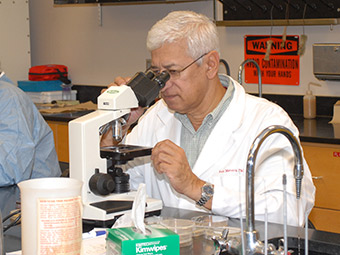Arbuscular mycorrhizal fungi (AMF) influences growth and insect community dynamics in Sorghum-sudangrass (Sorghum x drummondii)
Document Type
Article
Publication Date
2-27-2020
Abstract
Beneficial plant–microbe interactions in the rhizosphere have been found to enhance plant growth and development. Arbuscular mycorrhizal fungi (AMF), a major group among these microbes, have been found to improve plant fitness through mycorrhizal symbiosis. Despite being well documented in various natural and domesticated study systems, few studies have examined whether AMF also has cascading effects on other traits, such as influencing insect community dynamics through attraction/repulsion of beneficial and harmful insects. To test this, we planted Sorghum-sudangrass (Sorghum x drummondii), a fast-growing annual grain/forage crop, either inoculated with commercial AMF mix or left as control in lab and field experiments. We hypothesized that AMF would enhance plant growth and influence the recruitment of insect herbivores and their natural enemies due to possible alterations in plant defense pathways. Our results suggest that while AMF-inoculated plants had significantly better germination, growth, and establishment; they also experienced a lower initial incidence of Spodoptera frugiperda, a major herbivore on Sorghum in the Lower Rio Grande Valley. In addition, our insect community trapping experiment revealed that AMF-inoculated plants attracted significantly more beneficial insects (predators and parasitoids) and a lower number of damaging herbivores. Taken together, our field and lab data show that AMF can not only positively influence plant growth traits but can also provide defenses against herbivores by selectively attracting beneficial insects and repelling herbivores, with implications for sustainable pest management strategies.
Recommended Citation
Kaur, J., Chavana, J., Soti, P. et al. Arbuscular mycorrhizal fungi (AMF) influences growth and insect community dynamics in Sorghum-sudangrass (Sorghum x drummondii). Arthropod-Plant Interactions 14, 301–315 (2020). https://doi.org/10.1007/s11829-020-09747-8
Publication Title
Arthropod-Plant Interactions
DOI
10.1007/s11829-020-09747-8



Comments
© 2020, Springer Nature B.V.
https://rdcu.be/cQz5q